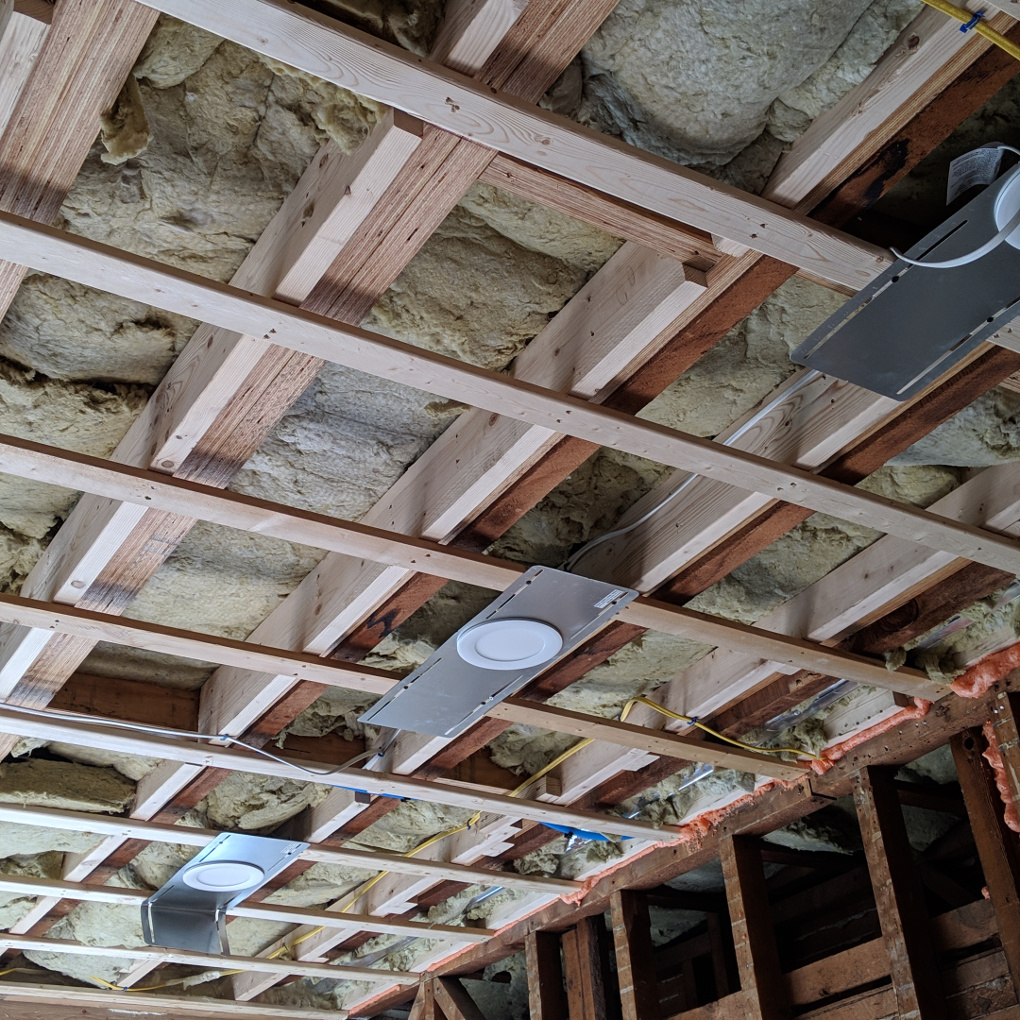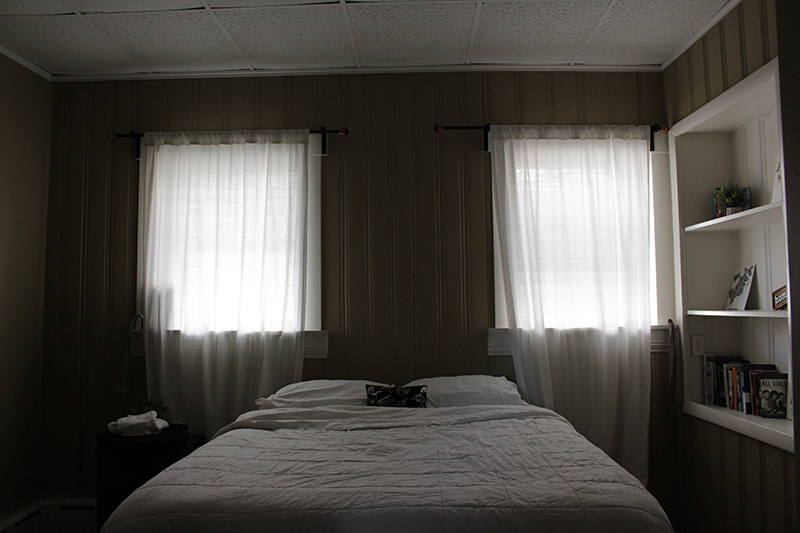How to Soundproof a Triple-Decker Rental Home
By Kimberly Rau, MassLandlords, Inc.
If you own a multi-floor rental property, like one of the triple-deckers that Massachusetts is well-known for, you’ve probably learned that sound can really travel between units, especially in older buildings. Fortunately, there are ways to soundproof a triple-decker that will certainly dull the noise coming from the floors above, if not eliminate it completely.

If your renters are telling you it sounds like there’s an elephant on the second floor, it’s time to soundproof your triple decker. [Image License: Derived Unsplash]
Why Attempt to Soundproof a Triple-Decker?
Anyone who has lived long-term in a multi-floor dwelling will tell you that noise from other tenants is part of rental life. If you live on the top floor, you’ll hear the door slams, shouts and comings and goings of those living on the lower floors. Tenants on the bottom floors will hear people walking, moving furniture and plenty of other noise coming through their ceilings. This is particularly true if there are small children living in upper units.
You can stipulate quiet hours in your lease. These are hours when excessive noise, such as loud music, is not permitted. But you can’t tell people not to walk around their home, and you can’t expect a newborn baby or toddler to not cry during quiet hours.
If you can take the time and have the funds to soundproof your rental, you’ll find that your tenants’ concerns will likely decrease in number.
Two Sound Types to Consider: Structural Noise and Air Noise
Before you start soundproofing your rental, you need to know what kinds of noise you’re dealing with. Typically, there are two main categories: air noise and structural noise.
Air noise, or airborne noise, is the kind of sound that travels through the air. Shouting, loud music, a child crying or a dog barking are all examples of air noise.
Structural noise refers to sounds that travel through solid structures before you hear them. The sound of footsteps from the floor above, which travels through the ceiling to the apartment below, is an example of structural noise. So is a toddler jumping off the couch, or someone dragging a heavy piece of furniture across the floor.
Air noise affects anyone in the nearby vicinity. If your tenant on the top floor is playing loud music, the renters below will hear it, but so will anyone in the yard if the volume is high or the windows are open. If it’s loud enough, the occupants on the bottom floor may be disturbed by it as well.
Structural noise sometimes travels in surprising ways. Even if there’s no one in the unit above, your second-floor tenants could be hearing noise from a side unit as the sound travels through the shared wall studs.
This is why soundproofing a triple-decker or other multifamily home is so important. You want long-term, considerate tenants, but even the most careful of renters is going to create noise. Working to mitigate that noise is one way to ensure your renters are happy and have good relationships with one another.

Rock wool (yellow) is visible stuffed between the joists of the floor above. The bays do not need to be full, as in insulation. There should be an air pocket above and below the rock wool to reduce noise travel. CC BY-SA MassLandlords
Soundproof a Triple-Decker: Reduce Air Noise Between Floors
To stop airborne noise from moving between floors in your rental, you must seal all the ways that air can move between those units. Why do you roll down the car window at the drive-thru to place your order? It’s because normal conversational tones are dulled by that pane of glass between you and the speaker. Even if you were shouting, it would be difficult for the person taking your order to hear you. Open the window, and the airspace is now clear for you to be heard.
The same principle applies to soundproofing triple-decker rental properties. Fewer places for air to travel between units means less airborne sound traveling between floors. Will you be able to soundproof your triple-decker so well that the renters on the second floor won’t be able to hear the colicky newborn on the top floor? Probably not entirely. But you can make it so that it doesn’t seem like the baby is in the same room.
The most effective way to soundproof a triple-decker against airborne noise is to open the walls and ceilings up, and install stone wool insulation, such as Rockwool, in the bays between the studs and joists. This will help keep noise traveling between units to a minimum, and will also act as a passive fire barrier, as the fibers are non-combustible and heat resistant. This is a good solution for new construction, as well as something to keep in mind during your next renovation. If air noise is a real problem between your rental units, it may be worth the trouble to schedule a special renovation with the specific goal of soundproofing using insulation.
If taking your rentals down to studs and joists to install insulation isn’t in the cards right now, there are still ways to muffle airborne noise and soundproof between floors. Sound needs air to travel. Any holes around pipes or between floors will increase the amount of noise that travels between rental units. Any holes in the ceiling or floors need to be closed with foam or a comparable barrier. Cracks need to be caulked or otherwise sealed. Get out your flashlight and have someone in the other unit tell you if they see any light coming from the ceiling (or floor). Pay close attention to areas near pipes or cables. These are prime areas for air passages.
While you’re at it, check around doors and seal any gaps there too. You’ll reduce noise and probably make your rental units more energy efficient. Small holes can still allow a lot of noise to get through, so don’t overlook anything.
If the problem is really severe, or you have units side-by-side that are complaining about airborne noise, you can purchase acoustic panels for the walls or double sheetrock to help deaden the sound. If this isn’t practical, encourage your renters to move heavy furniture against the shared walls to create more of a sound barrier.

Dropped ceilings can make units a lot noisier; replacing them with acoustic-rated tiles will help with sound transference. [Image License: Unsplash]
How to Reduce Footfall Noise
Structural noise can be difficult to soundproof against, but it is possible. It’s easier if you are dealing with a new construction project, of course, but even an older triple-decker can be made quieter with some effort.
The goal here is to stop sound waves from traveling through the house’s frame. Simple solutions include encouraging your tenants to put down area rugs. Fabric muffles sound, allowing less to travel through the floor and making footsteps quieter. A cork underlayment placed beneath an engineered or vinyl floor will also work well to soundproof your rental against footfall noise.
When you think of muffling noise, you probably focus on high-traffic areas such as living rooms and hallways, but don’t overlook the bedrooms when you start soundproofing a triple-decker. Many noise complaints our landlords receive stem from neighbors overhearing sounds from these more private spaces.
Now that you’ve addressed the floors in the upper rental units, head downstairs and look at the ceilings of the units below. What are you working with?
If you have a dropped ceiling, replace the old tiles with new ones that are acoustically rated. Home Depot sells a basic acoustic tile by Armstrong. We mention this store and brand specifically due to our MassLandlords membership benefit that gets housing providers discounts on most items the retailer offers.
One note: the box store acoustic tiles are not low in volatile organic compounds, which are an eye and throat irritant. If the room they’re installed in reaches 80 degrees or higher, or is unventilated, you will be subjecting your renters to indoor air quality issues. Make sure your tenants understand the importance of setting the air conditioning to below 80 degrees in the summer, or keeping the windows open, to avoid this issue. Outgassing will occur for several years until the VOCs are boiled off. If your budget allows, talk to an Armstrong sales representative about a low-VOC residential offering (expect to pay two to 10 times more because low VOC products are aimed at commercial or medical purchasers).
If your ceiling is sheetrock or plaster, your options for soundproofing your triple-decker are more limited. But if you’re feeling ambitious, solutions are out there. Sound-isolating sheetrock hangers allow you to suspend a new sheetrock ceiling under the existing one in such a way that your lower unit will be acoustically isolated from the upper one. This is a difficult project to install. You will need a special caulking to make the ceiling look wall-to-wall. If you have any recessed lighting, it will need to be rehung. If you have the funds, this is a great way to lessen noise between floors, but if such a project is low on your priority list, you can always work on the floors.
How to Soundproof a Triple-Decker: A Word on Installing Heat Pumps
Heat pumps are an environmentally friendly way to heat and cool buildings without relying on fossil fuels. Though it is a comparatively new technology, more people every year are embracing heat pumps as a more efficient alternative to fossil fuels such as oil or gas.
If you are planning to have a heat pump installed, pay attention to how the outside half of the unit is installed. While the inside portions of heat pumps are quiet, the outside portions (the condensers) can create quite a racket. You don’t want that noise transferring inside the rental to your tenants.
For roof-installed condensers, you must have isolating rubber bushings installed along with the unit. If not, the noise may create deafening resonance in the rooms below. This is also why it is not recommended to install a condenser on an exterior wall. The rubber bushings are not as effective in this instance, and the noise will be more pronounced. But if you absolutely must install the condenser on an outside wall, don’t ever put it against a bedroom wall. No one wants to wake up to the dulcet tones of a heat pump condenser, no matter how environmentally friendly.
Soundproof, and Encourage Communication
Good communication can solve a lot of problems before they get out of hand. We have written about how to handle noise complaints in rentals in the past, and the top tip was to work on communication, both between you and your renters, and your renters themselves. Unless your triple-decker is owner-occupied, your tenants are spending a lot more time in the house, and around each other, than you are.
If your second-floor tenant works from home and enjoys singing opera at all hours, and your first-floor tenant is home with a new baby, a little communication about scheduling rehearsal sessions around naptime could ward off resentment. Conversely, if the family on the third floor is planning to have an all-day birthday party in the backyard, inviting the other families to join in the fun will virtually guarantee they won’t complain about music playing all afternoon. But this only works if your tenants get along and are friendly.
If your tenants are civil toward one another but not friends, or if they have some animosity, then direct communication between neighbors may not be the most effective solution. But effective communication with you is still possible. If you are aware of noise issues, you can address them to the best of your ability before things escalate.
Conclusion
Everyone, even the most extroverted among us, wants a little peace and quiet sometimes. This can be difficult in apartment living, but not impossible. If you are renovating or participating in a new build, make sure you keep soundproofing your rental at the top of your list. If you have an old building, keep less invasive and temporary solutions in mind as you navigate noise issues. Your renters will thank you for it.




